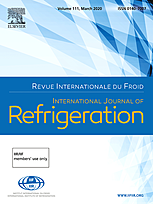
Recommandé par l'IIF / Document IIF
Modélisation de la liquéfaction de l’hydrogène à l’aide de cycles magnétocaloriques à aimants permanents.
Modeling of hydrogen liquefaction using magnetocaloric cycles with permanent magnets.
Auteurs : FENG T., CHEN R., IHNFELDT R. V.
Type d'article : Article de la RIF
Résumé
Hydrogen (H2) is promising alternative to replace fossil fuels, but its transport and storage has been challenging. As H2 fuel cell vehicles are gaining traction, the infrastructure for storing large amounts of liquid H2 is needed. However, liquid H2 would suffer from boil-off loss, and traditional vapor compression refrigeration systems would not be able to economically recover the lost H2 due to the low efficiencies at cryogenic temperature. Magnetocaloric (MC) refrigeration systems could possess much higher coefficient of performance (COP) at cryogenic temperature compared to the vapor compression ones. Previous work on cryogenic MC systems, however, have only focused on large scale applications which use superconducting magnets to provide a large magnetic field but are prohibitively expensive to operate for small scale applications, such as that of a H2 refilling station. In this work, we model the performance of a MC refrigeration cycle using 1-Tesla permanent magnets for H2 liquefaction, with the objective of cooling H2 from 80 K (using liquid nitrogen as the heat sink) to 20 K (boiling point of hydrogen). We evaluate main performance metrics including the total work input to the refrigeration system, COP, total MCM mass in the system, and total volume of the permanent magnets, etc. Our modeling results indicate that such a permanent magnet-based MC cooling system is feasible for small-scale H2 liquefaction, with projected COP values significantly higher than those of vapor compression systems. This work provides design guidelines for future experimental efforts on permanent magnet MC cooling systems for cryogenic cooling.
Documents disponibles
Format PDF
Pages : 238-246
Disponible
Prix public
20 €
Prix membre*
Gratuit
* meilleur tarif applicable selon le type d'adhésion (voir le détail des avantages des adhésions individuelles et collectives)
Détails
- Titre original : Modeling of hydrogen liquefaction using magnetocaloric cycles with permanent magnets.
- Identifiant de la fiche : 30027797
- Langues : Anglais
- Sujet : Technologie
- Source : International Journal of Refrigeration - Revue Internationale du Froid - vol. 119
- Date d'édition : 11/2020
- DOI : http://dx.doi.org/10.1016/j.ijrefrig.2020.06.032
Liens
Voir d'autres articles du même numéro (41)
Voir la source
Indexation
-
Thèmes :
Applications des gaz liquéfiés;
Froid calorique (froid magnétocalorique, électrocalorique, élastocalorique et barocalorique);
Mesures thermodynamiques;
Liquéfaction et séparation des gaz - Mots-clés : Cryogénie; Gaz liquéfié; Hydrogène; Effet magnétocalorique; Modélisation; Simulation; Optimisation; Propriété thermodynamique; Liquéfaction
-
Research on a magnetic refrigeration cycle for ...
- Auteurs : UTAKI T., KAMIYA K., NAKAGAWA T., et al.
- Date : 14/06/2006
- Langues : Anglais
Voir la fiche
-
Dynamic operation of an active magnetic regener...
- Auteurs : TUSEK J., KITANOVSKI A., PREBIL I., et al.
- Date : 09/2011
- Langues : Anglais
- Source : International Journal of Refrigeration - Revue Internationale du Froid - vol. 34 - n. 6
- Formats : PDF
Voir la fiche
-
Alternative method of helium liquification achi...
- Auteurs : MONDAL B., DAN S., MONDAL S., RANGANATHAN R., MAZUMDAR C.
- Date : 12/2021
- Langues : Anglais
- Source : International Journal of Refrigeration - Revue Internationale du Froid - vol. 132
- Formats : PDF
Voir la fiche
-
Assessment of near Pr2/3Sr1/3
- Auteurs : CHDIL O., BALLI M., RANGO P. de, EL MAALAM K., EL BOUKILI A., MOUNKACHI O.
- Date : 01/2022
- Langues : Anglais
- Source : International Journal of Refrigeration - Revue Internationale du Froid - vol. 133
- Formats : PDF
Voir la fiche
-
High-efficiency magnetic refrigeration using ho...
- Auteurs : TERADA N., MAMIYA H.
- Date : 19/02/2021
- Langues : Anglais
- Source : Nature Communications - 12
Voir la fiche